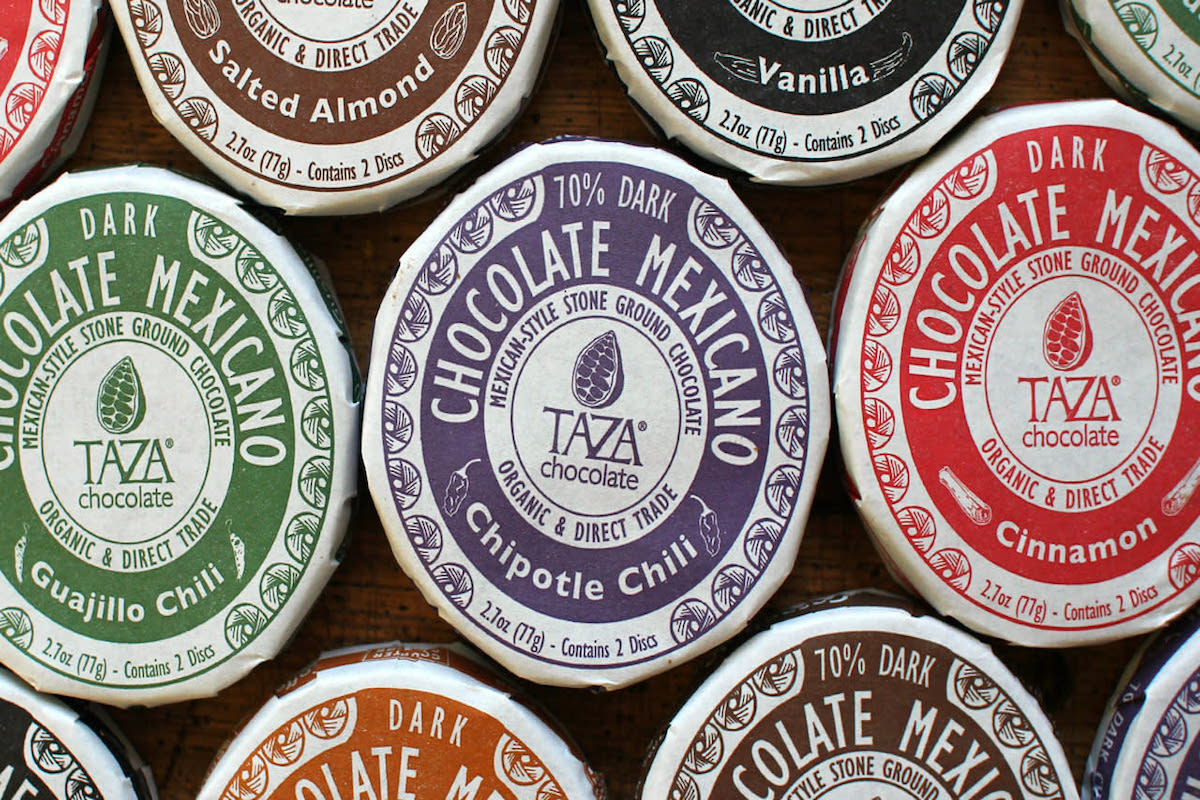

Taza Chocolate Company is not appreciating Mexican culture, but appropriating the Indigenous root of Mexican identity in order to rake in profits.
I purchased a Taza chocolate bar because its label signals Mexican identity. “Taza” is Spanish for “cup,” and the product label read “Chocolate Mexicano” and “Cacao Puro.” Much to my chagrin, I later found out Taza Chocolate is not made in Mexico or by Mexicans. It is made in Somerville, Massachusetts, and the company’s two white founders live in the 94% white town of Scituate, a very affluent community in the state’s South Shore.
Taza’s origin story goes: anthropology-degreed Alex Whitmore goes searching for a Mexican food product he can commodify into a corporation. He says he apprenticed with a nameless Oaxacan “molinero (miller)” for an unspecified amount of time (weirdly vague) to learn their “authentic” cacao and “traditional” grinding technique. I think their story sounds worse than Taza Co. realizes.
This story sounds like Whitmore played the role of corporate colonizer tricking the good-natured brown people for their secret cultural techniques. Whitmore’s culture-hawk toned story reminds me of the white ladies who went to Mexico looking to pirate Mexican burrito techniques so they could profit from it in the U.S. Additionally, it seems Taza doesn’t do business with people in Mexico.
Whitmore’s branding scheme is also contributing to the harmful myth that “all the Indians are dead” so that white people have the right replace them and use their culture. Meanwhile Mexicans today, even if fully assimilated, are the descendants of the Indigenous people who survived the genocides committed by Europeans.
Considering the facts, it seems Whitmore planned for his corporation to use Mexican identity as a brand to differentiate itself in a flooded chocolate market to maximize profit.
Since white people only believe other white people about the authenticity of Mexican cuisine, and not a Chicanx like myself, note that the Wall Street Journal quotes white expert Clay Gordon as saying, “Technically… there’s really no such thing as Mexican-style eating chocolate. You’re not supposed to eat it.”
White Americans of all political affiliations hate Mexicans. And if 742,731 Mexicans hadn’t been deported between 2014-2018 and weren’t the majority of deported people, white people commodifying Mexican culture would be less of an issue.
Note the four publicly traded Mexican food companies in the U.S. are owned and operated by white people. Mexicans and Chicanxs don’t have equity in their own cultures in the U.S.
Let’s not forget one of them, Chipotle, doesn’t stick up for undocumented immigrants’ rights. As far as I know Taza is also silent on undocumented immigrant issues. This is part of what makes companies like Taza appropriators.
Some say food is a mixing of cultures and therefore appropriation is impossible. This idea ignores the history of colonization in general. Mesoamerican nations did not meld their cuisine with Europeans. Europeans came to the Americas and murdered, raped, spread their diseases, and have continued to extract the resources of Indigenous peoples in the Americas to this day. Europeans that made corporate empires out of selling chocolate are part of the legacy of theft and violence, not cultural exchange.
Taza is practicing fair trade (at least by today’s hardly moral corporate standards) in its dealings with Latin American and African cacao producers. White Americans behaving minimally decent does not inspire me to praise them. But Taza heavily promoting their fair trade practices feels like a cynical marketing ploy to justify the premium cost of their products to their consumers.
Overall, it seems to me Whitmore is cynically marketing his chocolate as more authentic to the Indigenous Nations of the Americas that invented cacao consumption, to make his fortune.
It also seems Whitmore isn’t stopping at plundering Mexican identity. Taza is currently marketing
Bolivian and Dominican premium chocolate “origin bars.” I am certain Taza will expand this practice of leveraging non-white identity to their other African, Latin American, and Caribbean cacao suppliers.
However, if Taza were to reduce it’s slogan to “Mexican Inspired” alone and stopped feigning Mexican identity in their marketing, or if I were to learn Taza corporation publicly advocates for and fights prejudice against undocumented immigrants, since the majority are Mexican, I will change my opinion of Taza Chocolate Corporation.
***
Fabián Chávez is a Chicanx writer born and raised in East San Jose CA, currently living in MA, pursuing his English B.A. at UMASS Boston. He tweets from @FabianHorologst.


